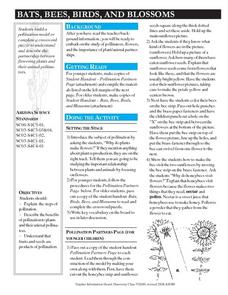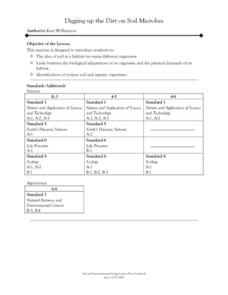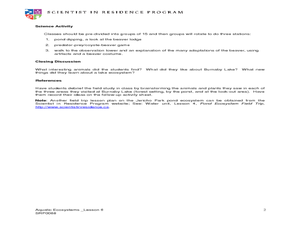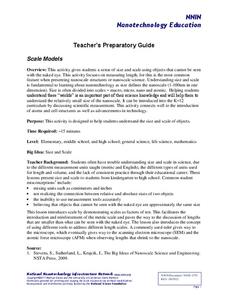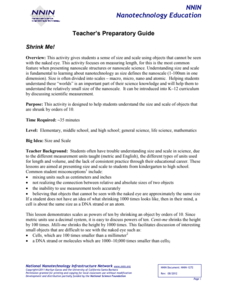Curated OER
RAINFOREST Mini-Unit
Learners engage in a variety of activities to investigate the subject of rainforests. The instructional activity focuses on the different floors of the rainforest and the types of life that exists on each.
Curated OER
PLANT LIFE CYCLES
Student learns about the life cycle of plants by watching a time-lapse video. This activity provides students with further evidence that all living things grow and change as they progress through their life cycle.
Curated OER
Bats, Bees, Birds, and Blossoms
Youngsters use a paper bee to pollinate two paper flowers. They use hole-punch dots as pollen. Older learners dissect flowers and name the structures involved in pollination. The handouts mentioned in the lesson plan are not included, so...
Curated OER
Digging up the Dirt on Soil Microbes
Students are introduced to the idea of soil as a habitat for many different organisms. They are introduced to the links between the biological adaptations of an organism and the physical demands of its habitat. Pupils are introduced to...
Curated OER
Burnaby Lake Field Trip
Learners identify different organisms found in the lake ecosystem. In this life science instructional activity, students discover the predator-prey relationship through a game. They explain how beavers adapt to the environment over time.
National Nanotechnology Infrastructure Network
Scale Models
With instructions to adapt the activities for any grade K-12, any teacher can incorporate the concept of scale into the classroom with a simple, yet effective lesson.
Curated OER
Local River Life
Learners identify rivers in their county, state, or province, and
research various kinds of animals and plants living in or near the rivers.
They write short summaries about the animals and plant life, draw pictures, and compile...
Curated OER
Are Plants Useful to Man?
Here is a presentation geared toward very young learners. Each slide includes one or two sentences using simple text and related clip art to describe and illustrate one way we use plants in our everyday life. This PowerPoint provides...
Curated OER
Life in a Log
Young scholars identify insects living in rotting logs. In this decomposition lesson, students observe pieces of a rotting log, they look at the insects that have inhabited the log and create a chart that shows their findings.
Curated OER
Goldilocks and the Real Bears
Students participate in a comparison instructional activity where they compare fictional bears to real life bears. In this science/language arts instructional activity, students read Goldilocks and the Three...
Curated OER
The Art and Science of Impressionist Color
Discover Impressionist painting as students investigate the 19th century combinations of colors characteristically used. Students experiment with their own paintings, utilizing primary and secondary colors.
National Nanotechnology Infrastructure Network
Shrink Me!
The incredibly shrinking meter—decimeters to centimeters, to millimeters, and now to nanometers! Learners may have a difficult time visualizing particles on a nanoscale. Help them see a little clearer using a well-designed lesson...
Curated OER
Planting Rabbit King’s Carrot
Even pirates know not to steal stuff you can make yourself! Read The Pirate's Parrot Stole the King's Carrot to engage your class. Then, plant carrots with your class. If this isn't possible with your kiddos, consider cutting out paper...
Curated OER
Dinosaurs
Learners are introduced to the various types of dinosaurs and write in their journals about their favorite one. After listening to a story and watching a filmstrip, they color a few pages in their Dinosaur Friends Book. They also examine...
Curated OER
Links in a Food Chain
Little ones make costumes and act out a rhyme in which there are daisies, bugs, wrens, snakes, and foxes that all interact in a food web. This would be a memorable activity for primary life scientists to participate in as a wrap-up...
Curated OER
Measuring Snowfall
Students predict the amount of snowfall for the week and measure snowfall. In this measuring snowfall instructional activity, student use a precipitation gauge to measure the week's snowfall; and analyze the data to determine...
Curated OER
The Bear Necessities: A K-2 Computer Activity
Students demonstrate understanding of basic facts of polar bears based on their completed worksheets. They then demonstrate basic skill at scrolling on a Web page and identify key points in text.
Alabama Learning Exchange
Peeking At Pumpkins
Students listen to a read aloud about the life cycle of the pumpkin and discuss the process. They complete a life cycle booklet.
Curated OER
Agriculture is a Cycle
What do a bicycle and the life cycle have in common? Cover this and more with the series of cross-curricular activities included in this plan. Learners do everything from making bracelets that represent the life cycle to checking out the...
Curated OER
Animal Homes
Students explore how an animal's relationship to its habitat affect the animal's survival. They discuss animal habitats and the animal's relationship to that habitat through the food chain, life cycle, community, and balance of nature....
Curated OER
Larva and Adult Antlion Body Parts
Students identify the major body segments of antlions. Through the use of diagram worksheets, students label the various body parts of the antlion. They review the life cycle of antlions from the larva stage to adult. Several activities...
Curated OER
Living-Nonliving
Students determine that environments have living and nonliving parts. They discuss what makes something a living thing and something a nonliving thing. They make a chart and list characteristics of living things and nonliving things.
Curated OER
A Planting We Will Go
Even the youngest kids can make scientific comparisons using collected data. They read The Tiny Seed, then discuss the essential nutrients and elements needed for a seed to grow into a blooming plant. They plant seeds and track their...
Curated OER
The Life Cycle of the Butterfly
Students examine the life of a butterfly. They write a biography from the point of view of a caterpillar using new vocabulary. They use magnifying glasses to examine butterflies and caterpillars.
Other popular searches
- K 2 Life Science Growth
- K 2 Life Science Living
- K 2 Life Science Insects
- K 2 Life Science Salamander
- K 2 Life Science Hibernation
- K 2 Life Science Adaptation
- K 2 Life Science Cells
- K 2 Life Science Nonliving
- K 2 Life Science Wind


